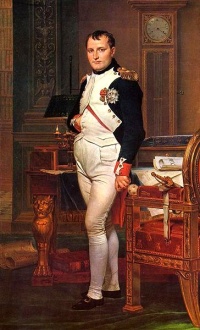Napoleon und Esterházy: Unterschied zwischen den Versionen
K |
|||
| Zeile 1: | Zeile 1: | ||
== Napoleon und Esterházy == | == Napoleon und Esterházy == | ||
| + | [[Bild:Napoleon.jpg|thumb|200px|Napoléon Bonaparte in seinem Arbeitszimmer (Gemälde von Jacques-Louis David, 1812)]] | ||
<blockquote> | <blockquote> | ||
After the battle of Austerlitz, Austria lay prostrate at the feet of the modern Attila, and Napoleon had thoughts of erecting Hungary into a separate kingdom. | After the battle of Austerlitz, Austria lay prostrate at the feet of the modern Attila, and Napoleon had thoughts of erecting Hungary into a separate kingdom. | ||
Aktuelle Version vom 5. Februar 2009, 00:51 Uhr
Napoleon und Esterházy[Bearbeiten | Quelltext bearbeiten]
After the battle of Austerlitz, Austria lay prostrate at the feet of the modern Attila, and Napoleon had thoughts of erecting Hungary into a separate kingdom. It struck him he could not alight upon a sovereign more likely to be acceptable to the Hungarians, and who would possess more power of his own, than the head of the great house of Galantha, the father of the present Prince Esterházy. The offer was rejected by the father as well as the son, and Bonaparte, taking the latter prisoner, when he made himself master of Vienna, threw the young prince into prison, to punish him for his contumac. When he had remained there some time, and his physical and moral strength were supposed to have given way, and it was thought he could no longer resist the temptations of liberty and dominions, he was sent for in the middle of the night, and brought from the darkness of his dungeon, into the brilliant atmosphere of the Conqueror's Court. But neither the temptation, nor the fascination of Napoleon's eagle eye, nor the fear of consequences, could move the loyal and youthful prince, and he was thrown once more into prison. There he remained until Napoleon touched with admiration and pity, released him.
Quelle[Bearbeiten | Quelltext bearbeiten]
Anecdotes of Napoleon Bonaparte and His Times
Zusammengestellt von A. Cunningham
Veröffentlicht von J.B. Perry, 1855
Original von New York Public Library
Seiten 429-430
